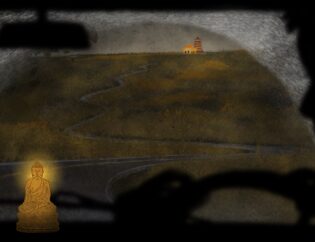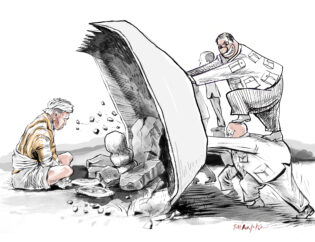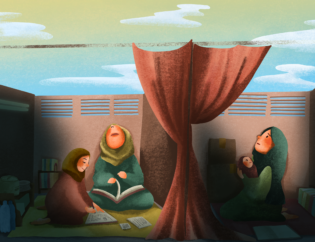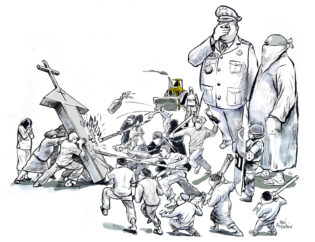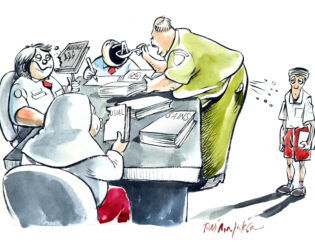Tiros People
Linda Christanty
Mon, 15 January 2007
April 10th 2006 was the day the Acehnese celebrated its peace accord with the Indonesian government. As over 10,000 visitors that day paid respect to the family of Hasan Tiro, founded and the leader of the Free Aceh Movement (GAM ). Journalist Linda Christanty interviewed founding members of GAM and the family of Tiro regarding the historic Helsinki Pledge: Will it bring real peace to Aceh?
April 10th 2006 was the day the Acehnese celebrated its peace accord with the Indonesian government. As over 10,000 visitors that day paid respect to the family of Hasan Tiro, founded and the leader of the Free Aceh Movement (GAM ). Journalist Linda Christanty interviewed founding members of GAM and the family of Tiro regarding the historic Helsinki Pledge: Will it bring real peace to Aceh?
SEVERAL men were in the room, sitting cross-legged on the floor. Before I set foot in the room, Fatimah binti Ali hurriedly whispered, “Put on a veil, you must wear a veil. There is an elder present.”
Fatimah is the head of a primary school in Pulo Tambo and traveled seven kilometers to attend this gathering in the village of Trueseb, subdistrict of Tiro, Pidie.
Fatimah chatted and joked with several other women in the dining room away from the men.
A man in his 60’s wearing a black peci (Indonesian traditional hat) and white koko (Indonesian traditional shirt for man) was engrossed in talking to the other men in the sitting room.
Opposite the old man sat Sarjani Abdullah, former Pidie-area based commander of the Free Aceh Movement. Sarjani was of normal build, with dark skin. He wore a brick red shirt and black pants and was silent as the old man addressed the male group.
Next to Sarjani sat Tengku Maatmuda, a member the Acehnese Transitional Committee, also listening attentively to the proceedings.
After a few minutes the host, Tengku Muhammad Mustafa di Tiro, emerged in the doorway and immediately sat next to the old man.
“I like to hear his stories,” Mustafa said to me in a deep voice.
“You can interview him (the old man), because he is our senior,” said Maatmuda to me.
“Yes, it is true,” Sarjani nodded.
“What do you want me to tell you?” The old man asked me, laughing.
“You don’t know him? He was the first of our fighting generation,” Maatmuda said to me.
The old man groped in the pocket of his trousers, took out his wallet and showed me his red and white ID card in the name of Tengku Darul Kamal. It said that he was born in 1944 in a village called Lhok Rhem, in Pidie province.
“But this is not the original” he said with a burst of laughter. “I actually was born in 1942.”
Kamal first met Tengku Muhammad Hasan di Tiro in 1971. Tiro is the top leader of the Free Aceh Movement, more popularly known as GAM. Tiro had just returned from a long period in the United States where he earned his Doctorate in Political Science from Columbia University. Tiro was the very first Indonesian to earn his Ph.D. Kamal was studying at the National Islamic Institute Ar-Raniry, in Banda Aceh that same year.
Kamal came to visit Tiro and to hear his stories and travelogues. Tiro’s mother was the sister of Kamal’s grandfather. Tiro often spoke about the Acehnese past glories and traditions, but never about his experiences in the United States. “He wrote the book Aceh in the Eyes of the World,” said Kamal.
I admitted that I had not read it.
Shortly after beginning our discussions, Kamal and I decided to move into the dining room to escape the noise of the rain outside and continued the interview. Mustafa followed us while the rest stayed in the sitting room. The women in the dining room stopped talking immediately and left the room one by one when we entered.
“Tiro decided that Aceh had to be independent. There was no option,” said Kamal. “The country was too big to be controlled by the Government in Java. There was widespread hunger and the workers were out on strike. Big countries like the United States are shrewd and divide their country up into states. The government cannot control this country unless they applied a communist system. But it is impossible. Because of this Tiro decided that Aceh had to be independent.”
Tiro again came back from the United States to Aceh on 30 October 1976. He went immediately to the jungle and led the guerrilla Free Aceh Movement. Kamal was in Sabang, on Weh Island, working as a volunteer to improve village administration. Returning home to his own village, his friend told him about Tiro.
Kamal was very curious of Tiro’s activities and decided to try to meet up with him. They met again in the Tjokkan Mountains in April 1977, six months after Tiro’s return.
Kamal was not alone in his travels. He was accompanied by his intimate friend Tengku Syeh Ibrahim. Kamal reported that after leaving a village called Pintu Satu (First Door) they walked together up the mountain, meeting along the way another ten men who shared the same goal – each was interested in learning why a highly educated and successful business man like Tiro would choose to live in the jungle.
After hours of walking, fording rivers and battling through thick jungle, they came across a small shelter used by farmers to guard their ripening rice. They fell asleep exhausted by the day’s arduous travels, before making the onward journey the next day.
“In the morning one village woman turned up and told us there had been a violent outburst of gunfire from the village of Pintu Satu. After that, one village man came to us and he said that a large number of cars and men had arrived and the residents’ houses were raided,” Kamal explained to me in the dining room in the absence of any of the other women.
“One of the houses that was raided belonged to a man called Geusyik Umar. The meaning of geusyik is head of village,” Kamal explained, knowing that I did not speak Acehnese. “He was a committed follower of Tiro and he was armed. When the Indonesian military raided his house he fired at them. Those were the first shots fired in the battle for Aceh Independence. Those were the first shots fired by GAM.” Kamal smiled as he said these words.
Although the Javanese troop’s blockade totally surrounded the village, Umar managed to escape to the mountains. Later, he would be shot dead by the Indonesian troops in 1992, during a military operation code-named “Jaring Merah” (Red Needle). At age 70 he was still fighting for the Free Aceh Movement – the dream of an independent Aceh – and he died fighting for that dream.
“All except two of his children had been killed by Indonesian troops. One escaped to Sweden and another, the youngest child, was already there,” Kamal continued. Umar’s son, Bachtiar Abdullah, still lives in Sweden today and continues to serve as one of the Free Aceh Movement’s senior figures and spokespersons.
When Kamal and his friends finally arrived at Tiro’s camp after their three-day trek up the mountain, they found 15 men already there. Not all were armed. The six that were armed had the United States made Springfield rifles. Kamal was reluctant to talk further about his three early years in the bush with Tiro, but paused to reassure me that he himself had never raised a rifle or shot at anyone. His weapon was the printing press. For years he churned out leaflets demanding that the Javanese go home. He sent most of these to PT Arun.
At that time a giant natural gas company called PT Arun established its main office in Lhokseumawe, North Aceh. In 1974 the refinery began to extract the natural gas found in Aceh. Mobil Oil Indonesia, a subsidiary of the United States-based Exxon Mobil, has a 35 percent stake in PT Arun. Jilco, Japan company, has 15 percent. Mobil Oil has supported the Indonesian military in Aceh by providing ammunition and other logistical support.
“Sealed off from its surrondings by a large fence, PT Arun has become a symbol of Jakarta’s domination and the theft of valuable resources from Acehnese people by the economic and political elite of the Javanese empire and the multinational corporations it cohorts with. It is 50 percent owned by state oil firm Pertamina,” wrote Eriko Uchida in her article Aceh Ceasefire Extended But Indonesian Military Killings go on. Uchida is a Japanese journalist.
Shortly after PT Arun opened its doors it was followed by a fertilizer factory named Iskandar Muda Prop. Ltd, Asean Aceh Fertilizer and a paper factory named Kraft Aceh.
These companies realized that Aceh was rich in natural resources and were quick to exploit them for profit. To protect these economic assets Soeharto, the Indonesian president, sent thousands of troops into Aceh.
By 1980 there were regular exchanges of gunfire between the Free Aceh Movement and the Indonesian military. Eventually Kamal was arrested after being shot and wounded. “A military commander came up to me and asked: How many guns do you have. The Indonesian army has a lot more. We have tanks and everything else. What do you think you can do against that?’ I replied that this war wasn’t only about guns and hardware but about attitudes and a mindset that is as powerful or more powerful than weapons. The Japanese troops had powerful guns but they were destroyed by bombs in Hiroshima. The United States is a superpower but even it had to turn and run from Vietnam.”
Kamal was kept in Kedah jail, Banda Aceh, for three years. Upon release he set up a Moslem boarding school using the curriculum which paralelled the Indonesian National Department of Education, including math and Indonesian grammar.
But Kamal’s freedom was not destined to be long lived, and he soon found himself back in a Lhok Nga jail. An Achenese legislator who wanted to join the Free Aceh Movement in Malaysia was arrested by the army and informed on Kamal as a key man. Without due process, Kamal was marooned in jail for another year.
When given his freedom the second time, he decided to be a farmer like most of the people in his village.
In 1998 the governor of Aceh, Samsudin Mahmud, asked Kamal to accompany him on a political mission to Sweden. The team was to be led by Noer Naemat, an Acehnese businessman. The team wanted to meet the exiled Tiro and negotiate the future of Aceh with him. Tiro had no interest in meeting with them.
“He knew I was coming and said that I could meet him up but I would not be able to return home again.” Recalling that moment, Kamal laughed.
“Tiro is the leader of our people, but we are just representatives from Aceh. We are not representatives of the Indonesian government. I think Tiro was right. He didn’t meet us, because we were just representatives of local government.”
THE narrow dining room, only 3 x 5 meters, could hardly hold all the food laden tables, but there was enough space between the chairs to enable us to sit comfortably.
“Politics is dangerous. I don’t like it.” Muhammad Mustafa di Tiro said in a soft voice to me. Despite the dining room being deep inside the house there was still a lot of competing noise. Mustafa’s voice rose and fell and sometimes faded completely as the other guests voices and the continuing rain on the metal roof threatened to drown him out. “For example, if you want to take over a political position, you will do anything to get it. Politics is like that. Cruel. I don’t like politics.” His gaze was direct, and his white Haji cap contrasted strikingly with his dark skin.
Mustafa was 45 at the time of my interview. He never had the chance to meet Hasan Tiro, his very politically involved uncle. In 1979 Tiro left Aceh, three years after he declared Aceh’s independence. He has led a government-in-exile with several of his self-styled ministers in Sweden.
On that day, 10 April 2006, Mustafa was very much the host. People had come from all over the province, attracted to Tiro’s hometown as ants are to sugar.
Our table was crowded. Plates held beef curry and nasi bukulah – rice wrapped in banana leaves in the local style. Lots of water glasses. Red curry stains seemed to decorate the busy table cloth, even though the spills were inadvertant.
Also on the table was a metal hand washing pitcher and bowl that attracted my attention. Their form was quite unusual. What looked like a teapot containing clean water sat above a wide round tin that held the dirty water. “It comes from Malaysia,” said Musatafa’s wife Juraiza, when I asked about its orgins. She was busy serving the guests, carrying food balanced on her arm as she came and left the house.
Wonderful smells eminated from the bubbling food and the open kitchen door as men and women passed close by. Every now and then one or two women would arrive smiling, spend some time watching the conversation and then leave. They could not speak Indonesian and came from nearby villages. They had offered to help prepare food for the expected 10,000 guests who would come and go to Mustafa’s house on this day of celebration. It was a party for peace time in Aceh and the Maulid Nabi, Prophet Muhammad’s birthday.
Mustafa had prepared himself for this ceremony as requested. “Some of them were GAM requests and some came from village people,” he said.
Although he supported this party, he did not like politics and his relationship with Tiro caused some problems for him during the conflict times.
His wife Jamaiza stood next to him, tossing in the occasional comment. She is a chubby woman with an easy smile.
“After the Indonesian military interogated him, my husband was feverish all the time,” she laughed, referring to the times of the military emergency.
A little embarassed, Mustafa chimed in, “Yes, they kept asking me what kind of relationship I had with Tiro. Did he contact me? I would say if yes, so what? If no, so what?…. but they didn’t reply, and would go on and change the subject.” He felt the military actions were not reasonable.
Mustafa was but a teacher, not a member of the Free Aceh Movement. He was in fact the only teacher in the village. He taught children how to read the Quran, the holy book of Islam. The school was not far away – he conducted daily classes in a prayer house right in his own frontyard.
The musholla (prayer house) was built to look like a long wooden house that was originally built there in 1814. It was founded by Tengku Muhammad Amin di Tiro, the grandfather of Tiro.
Amin’s grave and that of his his followers lie alongside the nearby musholla and is a place of pilgrimage where the devout come to pray.
A sheet of white cloth denoting sainthood covers the bier marking Amin’s grave. The graves of his followers, follow normal Islamic practice and are level with the land and marked with simple black gravestones.
“Trouble is there, but the backlash is felt here,” Mustafa said with a smile. Tiro’s parents’ house was indeed only across the river from Mustafa.
OUTSIDE Mustafa’s house a man was busy greeting guests. Sarjani Abdullah stood up next to him. Catching my eye he asked, ”Do you speak English?” I replied, “I am from the Republic of Indonesia”. He laughed and then he pointed to the house next to the musholla and said, “Women are to go to the house and men are to stay outside here.” An old man around 70, dressed in a suit jacket and sarong, came up to him and hugged him. The old man walked away and embraced another and then openly cried.
“Who was that?” I asked him.
“I don’t know. I have never met him before. There are many here today that I don’t know.”
I walked over to the verandah of the house which was crowded with women both young and old. Small boys and girls sat together eating and drinking.
There I met Fatimah binti Ali. A big woman with a deep alto voice. She was friendly and happy to talk to. Since childhood she had wanted to be a teacher. Consequently she was nicknamed by her small schoolmates as ‘Ibu’ (mother).
Until two years ago when she retired, she had been head of the school here. Even now she is busy with many activities pulling her back to the school.
“Yes even now I sometimes have to be the office boy, buying coffee and making it for everyone. Sometims I have to teach when teachers are not available,” she explained, chuckling.
When I asked whether she would prefer to teach Indonesian or Acehnese children, she went silent, as did all the other women in the room. Just the question caused everyone to stop talking.
“My duty is to teach students as the state needs me to,” she replied, carefully.
When I looked around, Rasidah, wife of the village head, had tears in her eyes. After her tears dried, she began to speak using the Acehnese language. Because I could only catch a few words, a woman translated for me.
“What was it like?” I asked her. “What were your experiences.”
“I was really scared,” she said quietly. “So many houses were burnt.”
“What happened to your husband?”
“My husband tried to run, but the army chased him down. They threatened him and shot him, but he was only injured. He was OK. After that they came to our house in trucks and on motor bikes, all in uniform. They took away a lot of members of our family, including my brother-in-law, who we never heard from again”
“What do you want now?” I asked.
“Only peace and a contented life. I just want peace, safety and the ability to make a livlihood again. No more violence. When I think of what happened then I want to cry, and I see the army took my brother in law in front of my eyes.” She started weeping again.
Rasidah wanted independence from the country of Indonesia if the army is still brutal during peace time.
“I am sure,” she said.
TENGKU Darul Kamal knows that real peace is still a distant reality for Aceh.
“Maybe the Indonesian government has good intentions… but sometimes in the field, the army doesn’t care about the government rule… Sometimes GAM did it too. What the leaders need is not always the same as what the followers do.” He laughed loudly.
“What about Syariah (Islamic) law? Does it contribute to peace in Aceh?” I asked Kamal. Kamal replied that, “The problem being that Acehnese independence was never about the matter of Islamic canon law.”
Kamal does not believe that imposition of Syariah law would guarantee peace in Aceh. Far more important are economic independence and sovereignty.
“The Aceh Free Movment position,” Kamal went on. “is that Islamic law is of no importance. What we fought for was for Aceh to be handed over to Acehnese who had become poor in a resource rich area from years of colonization. It should have been up to us to decide if we wanted Syariah or not, not the central government in Jakarta. It’s up to us,” he reiterated, now looking very serious.
I had an important question dwelling in my mind. I asked him
“Is GAM fundamentally anti-Javanese?”
“Well it’s more about the Javanese culture. The Javanese are always saying inggih, inggih (yes, yes). Acehnese are different. Although a person might be our commander, we can laugh and joke with him. Not possible in Java. They have a different way of being, and are too feudal. For example, when they pay their workers for working in the field, the workers have to sit on the ground.” Kamal laughed loudly at this aphorism.
(Pramoedya Ananta Toer, Indonesia’s most famous author, hated what he called the cult of “Javanism”. He wrote that it was this subserviant attitude that made village heads in Java collaborate and cooperate with the Japanese occupation army and commit their fellow villagers to forced labour. The mentality “lick and flatter above, step on below” is the dominant culture of the Indonesian elite he wrote)
Currently Kamal is spending more of his time in the Seulimum mosque, Lam Jeruk, in Pidie, where he is the preacher. He established an organisation to help the local villagers protect their gardens and rice fields from wild bores. “The group is called Litbui. Lit which is Indonesian for chase and bui for wild bores.”
Despite being separated for 26 years and this new vocation, Kamal has stuck to his memories and links with Tiro.
Kamal’s expression kept changing as he talked; a smile, laughter, a look of dejection, amusement, sadness; each attached to vivid memories of Tiro. It appeared as though he was at times living in the past.
“What impressed you most about Tiro?” I asked, catching him in one such recollection.
“He was a clean man, really the cleanest. Each morning after he had eaten, he brushed his teeth; he wanted to clean his teeth and we had to also. When he woke up he cleaned his teeth. He taught us that. He also taught us not to eat after we cleaned our teeth. He always thought that Acehnese were very dirty. In fact cleanliness was an important part of the Prophet Muhammad’s teaching. Despite being a devout and meritorious man, Tiro could not tolerate lack of cleanliness.”
In April 10 2006, Hasan Tiro has still not returned to Aceh, although the Indonesian government and the Free Aceh Movement have signed the peace accord in Helsinki on August 15 2005. He is still in Sweden.
BEFORE leaving Treuseb, I saw Mustafa standing on the threshold of the musholla, from where one can enjoy a wide panorama. People walked up and down the stairs, passing him by. He remained where he was, not moving. Not far from there on the grounds of the Islamic senior high school stood tents filled and overflowing with invited guests. Many people sat on the school terrace.
As far as one could see, the long road was full of visitors. Parents with their children, all dressed in their best clothes. Grandfathers sat dazed on the side of the road. It was hard to know what was in their hearts. Were they happy? Were they sad or reflective? They had all been witness and participants, maybe even victims of 30 years of conflict.
Five hundred meters from the religious school a Toyota Patrol was parked in the parking bay, sticking out on the right hand side of the road. A plainclothes cop recorded everyone’s arrival with a handy cam. He filmed everyone who passed without regard to the intense heat or anyone’s scrutiny. He just continued recording everybody who came and went.
I immediately took off my veil, and walked quickly away.
Postscript:
On the 3 July 2006, three months after this report, there was an incident in Paya Bakong, Lhokseumawe, Northern Aceh. The Indonesian army shot and killed an Acehnese citizen outside the military complex. At that time, they also shot a member of the Aceh Monitoring Mission (AMM) who, as a result, was paralyzed by the bullet. Up until now no-one from the military has been brought to trial or punished. The AMM has also not taken any action.
*) Linda Christanty is a writer and journalist. She is editor in chief in the Pantau News Agency (Pantau Foundation) Aceh.
**) Translated by Melody Kemp.


